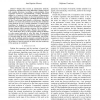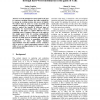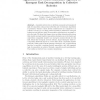12 search results - page 2 / 3 » Evolving Modular Fast-Weight Networks for Control |
GECCO
2008
Springer
13 years 6 months ago
2008
Springer
Legged robots are useful in tasks such as search and rescue because they can effectively navigate on rugged terrain. However, it is difficult to design controllers for them that ...
CEC
2009
IEEE
13 years 11 months ago
2009
IEEE
— Despite their success as optimization methods, evolutionary algorithms face many difficulties to design artifacts with complex structures. According to paleontologists, living...
CIG
2005
IEEE
13 years 10 months ago
2005
IEEE
Several attempts have been made in the past to construct encoding schemes that allow modularity to emerge in evolving systems, but success is limited. We believe that in order to c...
JITECH
2010
13 years 3 months ago
2010
We propose a design theory that tackles dynamic complexity in the design for Information Infrastructures (IIs) defined as a shared, open, heterogeneous and evolving socio-technica...
PPSN
2004
Springer
13 years 10 months ago
2004
Springer
A scalable architecture to facilitate emergent (self-organized) task decomposition using neural networks and evolutionary algorithms is presented. Various control system architectu...




